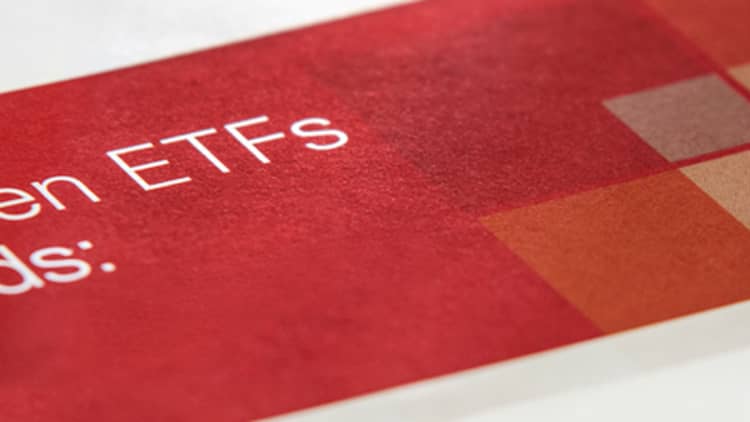
A year during which the market exceeded all expectations ends not with investors backing off but rather with them throwing caution to the wind.
The trend was particularly prevalent among those who prefer index funds, as ETFs saw their second-biggest week of inflows ever at $31.4 billion, according to fund flow data from Bank of America Merrill Lynch.
Active strategies, as expressed through mutual funds, saw huge outflows, with the $22.7 billion leaving the fourth-worst week on record. However, the difference of $8.7 billion still left the equity side of the ledger with a big week.
Speculation continues to build that the bull market is running out of steam, even as the major indexes continue to set records. The Dow industrials are threatening to break 25,000 as 2017 winds to a close, with the index up just shy of 25 percent including Friday's gains as of midday. The blue chips would need to pick up just another 1.5 percent or so to break the 25K barrier.
Market strategists worry that the inflow of money could signal that the rally is getting old and finally dragging the last bears in off the sidelines, a classic capitulation sign.
"As the stock market continues to soar, it is attracting more money into stocks. That's what usually happens during meltups," Ed Yardeni, founder of Yardeni Research, said in a blog post Friday. "The flow-of-funds case for a meltup is mounting as more hot money pours into equity ETFs."
"Meltup" refers to a sudden influx of investor cash based on momentum or sentiment rather than fundamentals. Melt-ups often precede meltdowns.
BofAML's count shows that stock-focused funds — both ETFs and mutual funds — have pulled in a net $294.7 billion year to date. Excluding mutual funds, the inflows to their passive counterparts have totaled just more than $448 billion. The big shift to passive comes even though stock pickers have had a comparatively good year, with 49 percent of large-cap fund managers beating their benchmarks, according to Goldman Sachs.
The most recent surge in ETFs came from some of the $3.4 trillion industry's most popular names.
The SPDR S&P 500 Trust fund pulled in just shy of $10 billion over the past week, the iShares S&P 500 Value ETF gained $2.2 billion and the iShares Mid-Cap 400 Value ETF grabbed about $1.4 billion, according to FactSet. Year to date, the iShares Core S&P 500 has been the big winner, with $31.6 billion in inflows as the $142.9 billion fund has returned nearly 20 percent.
While pouring money into other areas, investors last week yanked $2.2 billion out of the iShares Russell 2000 ETF, which tracks the small-cap index.
Professional investors have provided much of the enthusiasm for the market. The Investors Intelligence survey, which gauges sentiment from investing newsletter authors, has found bulls outnumbering bears at around the same level as just before Black Monday in October 1987, when the Dow lost 22 percent in a single day.
In fact, investors continue to hedge their bets, with inflows to bond funds totaling $348.1 billion this year even as performance between stocks and fixed income is at its biggest disparity on record.
WATCH: Why everyone got the market wrong this year.



